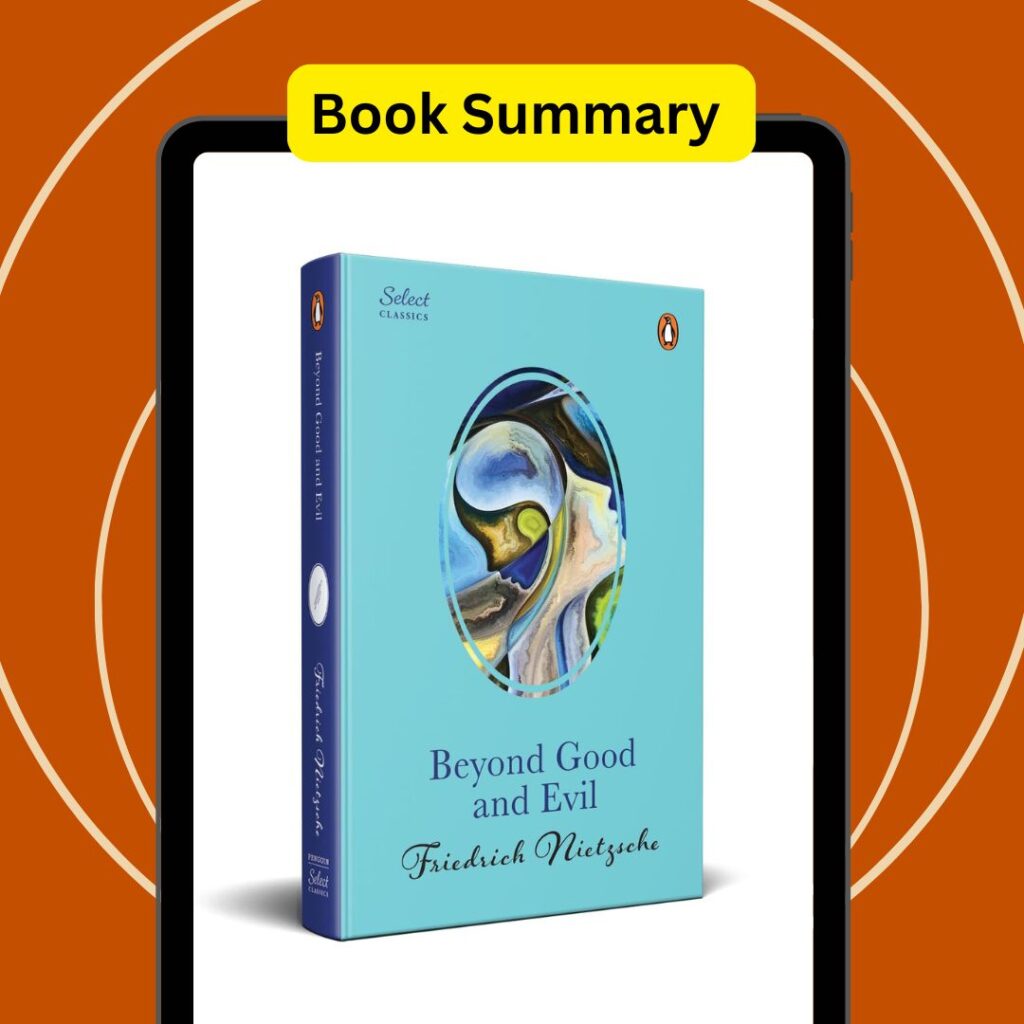Beyond Good and Evil Summary: A Comprehensive Overview of Nietzsche’s Philosophy
Friedrich Nietzsche’s Beyond Good and Evil, published in 1886, stands as one of the most significant philosophical works of the modern era. In this book, Nietzsche critiques traditional morality and offers a new framework for understanding human values, truth, and the complexities of existence. This summary will delve into the key themes, concepts, and insights from Beyond Good and Evil, providing a comprehensive overview of Nietzsche’s thought-provoking ideas.

Table of Contents
Introduction to Nietzsche’s Philosophy
Nietzsche’s philosophy is often characterized by its critique of established norms, particularly those rooted in morality, religion, and societal conventions. He challenges the binary thinking that categorizes actions and beliefs as strictly good or evil, arguing that such dichotomies oversimplify the complexities of human nature.
The Structure of the Book
Beyond Good and Evil consists of 296 aphorisms grouped thematically into nine chapters. Each aphorism presents a distinct viewpoint, often interlinked with others to form a broader narrative about morality, truth, and individualism. The book opens with a preface that sets the stage for Nietzsche’s critique of dogmatism in philosophy.
Key Themes in Beyond Good and Evil
1. The Critique of Dogmatism
Nietzsche begins by accusing philosophers of dogmatism, asserting that their theories often reflect personal biases rather than objective truths. He argues that every great philosophy is essentially a personal confession, revealing more about the philosopher than about reality itself. This critique extends to religious dogma, which he sees as a hindrance to genuine understanding.
2. The Nature of Morality
Central to Nietzsche’s argument is the idea that morality is not absolute but historically contingent. He contends that traditional moral systems—particularly those influenced by Judeo-Christian values—have stifled human potential by promoting a herd mentality. This herd morality encourages mediocrity and suppresses individual greatness.
3. Master vs. Slave Morality
Nietzsche introduces the concepts of master morality and slave morality. Master morality arises from the noble class, characterized by values such as strength, power, and nobility. In contrast, slave morality emerges from the oppressed classes, emphasizing humility, pity, and meekness. Nietzsche argues that modern society has largely adopted slave morality at the expense of individual excellence.
4. The Will to Power
The will to power is a fundamental concept in Nietzsche’s philosophy. He posits that this intrinsic drive shapes human behavior and aspirations. Rather than seeking mere survival or happiness, individuals are motivated by a desire to assert their influence and control over their environment.
5. Truth and Untruth
Nietzsche challenges conventional notions of truth and untruth, suggesting that both are integral to human life. He asserts that philosophical inquiry has often been hindered by an obsession with objective truth at the expense of subjective experience. By embracing both truth and untruth, individuals can achieve a more nuanced understanding of existence.
6. The Individual vs. the Crowd
A recurring theme in Nietzsche’s work is the tension between the individual and society. He believes that true greatness can only be achieved when individuals rise above societal norms and expectations. This idea resonates with his criticism of conformity and mediocrity prevalent in modern culture.
7. Women and Gender Dynamics
Nietzsche’s views on women have sparked considerable debate among scholars. In Beyond Good and Evil, he expresses controversial opinions regarding gender roles and women’s emancipation. While some interpret his remarks as misogynistic, others argue they reflect his broader critique of societal norms.
Key Insights from Beyond Good and Evil
1. Philosophical Inquiry as Self-Discovery
Nietzsche emphasizes that genuine philosophical inquiry requires introspection and self-examination. By confronting one’s biases and assumptions, individuals can uncover deeper truths about themselves and their values.
2. Embracing Complexity
The rejection of binary thinking allows for a richer understanding of human experience. Nietzsche encourages readers to embrace ambiguity and complexity rather than seeking simplistic answers.
3. The Importance of Individuality
Nietzsche champions individuality as essential for personal growth and societal progress. By cultivating one’s unique perspective, individuals can contribute to a more vibrant intellectual landscape.
4. The Role of Suffering
Suffering is presented as an inevitable aspect of life that can lead to growth and transformation. Rather than shying away from pain, Nietzsche advocates for confronting it head-on to achieve greater self-awareness.
FAQs
1. What is the main theme of Beyond Good and Evil?
The main theme of Beyond Good and Evil revolves around the critique of traditional morality and the exploration of values beyond the binary classification of good and evil. Nietzsche argues for a more nuanced understanding of morality, emphasizing individual perspectives and the historical context of moral beliefs.
2. What are master and slave morality?
Nietzsche distinguishes between two types of morality:
- Master Morality: Originating from the noble class, this morality values strength, power, and nobility. It celebrates life and individual excellence.
- Slave Morality: Emerging from the oppressed classes, this morality emphasizes humility, pity, and meekness. It often reacts against master morality by promoting values that favor the weak.
3. How does Nietzsche define the will to power?
The will to power is a central concept in Nietzsche’s philosophy, representing an intrinsic drive that motivates individuals to assert their influence and achieve greatness. It goes beyond mere survival or happiness, focusing on self-overcoming and personal growth.
4. Is Beyond Good and Evil suitable for all readers?
Yes, Beyond Good and Evil can be read by anyone interested in philosophy, ethics, or existential thought. However, readers may need to engage with its complex ideas critically, as Nietzsche’s writing can be dense and provocative.
5. What is Nietzsche’s view on truth?
Nietzsche challenges conventional notions of truth, suggesting that both truth and untruth play essential roles in human life. He argues that philosophical inquiry should embrace complexity rather than seek absolute truths.
6. How does Beyond Good and Evil relate to contemporary issues?
Nietzsche’s critique of dogmatism, conformity, and traditional moral systems remains relevant today. His ideas encourage readers to question societal norms, embrace individuality, and explore personal values in a rapidly changing world.
7. What impact has Beyond Good and Evil had on philosophy?
Beyond Good and Evil has significantly influenced existentialism, postmodernism, and various fields such as psychology, literature, and cultural studies. Nietzsche’s challenge to established norms continues to inspire critical thinking and discussions about morality and human nature.
Conclusion: The Legacy of Beyond Good and Evil
Beyond Good and Evil remains a cornerstone of philosophical thought, challenging readers to rethink their assumptions about morality, truth, and individuality. Nietzsche’s provocative ideas continue to resonate in contemporary discussions about ethics, identity, and societal values.By encouraging readers to question established norms and embrace complexity, Nietzsche invites us on a journey toward self-discovery and empowerment—one that transcends conventional notions of good and evil. This summary provides an overview of key themes and insights from Friedrich Nietzsche’s Beyond Good and Evil. For those interested in delving deeper into Nietzsche’s philosophy or exploring how these ideas apply to modern life, this work serves as an essential starting point for understanding one of history’s most influential thinkers.
Discover marketing services, interviews & publishing tools at SharingStories.



